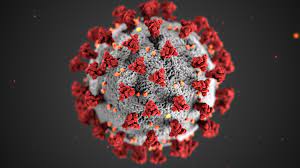Dr Tasaduq Hussain Itoo
With the emergence of multiple variants of COVID-19, including variants of concern like Delta and Omicron — leading to growing number of COVID-19 cases worldwide, it is important to deeply understand the evolving disease trajectory.
World Health Organization suggests that the overall risk related to the new variant of concern ‘Omicron’ remains very high since its recent outbreak worldwide. Consistent scientific evidence revealed that the Omicron variant has a growth advantage over the Delta variant. Originating probably from South Africa, the variant is massively spreading across the world including UK, USA and India, thus putting a strain on healthcare systems of the respective countries. In India,1500 mark of cases of Omicron was crossed till recently — involving around 23 states so far with Maharashtra, Rajasthan, Delhi and Telangana witnessing the rapid upsurge.
The rising surge in Omicron infections is thought to result from a combination of two crucial factors — increased transmissibility and the ability to evade immunity conferred by past infection or vaccination (immune evasion phenomenon). Epidemiological research and various scientific experiments suggest that immune evasion phenomenon has greater role than increased transmissibility with regard to Omicron. Moreover, immunity conferred by prior infection or vaccination is likely to be reduced by Omicron as compared to Delta and other prior variants, but not completely compromised. However, research studies also show that vaccinated people who either receive a booster dose or who were also previously infected are likely to have stronger protection against Omicron.
While the data on clinical severity profile of Omicron infection yet remains limited, it might strongly influence hospitalizations and deaths. However, preliminary studies suggest that the severity of infection with Omicron is less compared to prior variants. Though the proportion of infections associated with severe outcomes is lower than with previous variants, given the likely increase in number of infections — the absolute numbers of people with severe outcomes could be substantial.
Considering in nutshell the evolving scenarios and epidemiological evidence — varying degrees of transmissibility and immune evasion phenomenon can be attributed to Omicron — high transmissibility and low transmissibility together with high immune evasion and low immune evasion. With high immune evasion, evolving scenarios indicate that a large surge of infections could begin as early (as January 2022) and that the peak daily number of new infections could exceed previous peaks, while with low immune evasion — the surge could be lower and occur as late (as April/May 2022). Moreover, recent data trends from South Africa, UK and other countries are consistent with faster growth rate of Omicron variant. And many scientific studies are underway to deeply understand the literature of Omicron including other emerging variants of COVID-19 virus.
Unvaccinated people remain the greatest concern always — be it Omicron, Delta or other prior variants of COVID-19 virus. They are at greatest risk of transmission and more likely to get infected, and therefore transmit the virus. Fully vaccinated people get COVID-19 (known as breakthrough infections) less often than unvaccinated people. However, people infected with the Omicron or Delta variant, including the fully vaccinated people with symptomatic breakthrough infections — can transmit the virus to others, though for a shorter time –the amount of viral genetic material may go down faster in fully vaccinated people when compared to unvaccinated people. This means fully vaccinated people will likely spread the virus for less time than unvaccinated people.
Experts suggest the approved COVID-19 vaccines remain highly effective in limiting spread of the virus and minimizing severe disease — including against the Omicron, Delta or any other variants of COVID-19. For all people, the vaccine provides the best protection against serious illness and death. However, vaccines though highly effective, are not perfect and vaccine breakthrough infections may manifest. Overall, vaccination is the best way to protect oneself, one’s family and one’s community. Low vaccination coverage may drive the rapid surge in cases involving the Omicron variant — which also increases the chances that even more concerning variants could emerge. Conversely, high vaccination coverage will reduce spread of the virus and help prevent new variants from emerging.
As per Centres for Disease Control and Prevention(CDC), it is recommended that everyone 5 years and older should protect themselves from COVID-19 by getting fully vaccinated. Moreover, it is recommended that everyone ages 18 years and older should get a booster shot six months after completing their primary COVID-19 vaccination by an approved vaccine.
Moreover, during the current times while we are getting conscious about the emergence of multiple variants of COVID-19 including Delta and Omicron, besides working on studies for vaccine effectiveness and augmenting current vaccine coverage — layered prevention strategies, including wearing well-fitting face masks particularly indoors at public places or areas of substantial(high) transmission irrespective of vaccination status; adopting recommended physical distancing measures; opening windows to improve ventilation; avoiding poorly ventilated or crowded spaces; maintaining proper hand hygiene or adopting various sanitizing practices – are crucially needed to reduce the transmission of such emerging variants(including Omicron) and stop the ongoing pandemic.
The healthcare system that continues to remains stressed during the entire pandemic, more so due to ongoing burden of Omicron, Delta or other variant infections of COVID-19 and a rising burden of illnesses caused by other respiratory pathogens –such as influenza or other viruses (which have begun circulating at greater frequencies), a requirement of expedient public health action to prevent severe impacts on the health of individuals and the healthcare system is crucial. More to say, ambulatory care services, supportive and treatment facilities, infection control measures, testing measures, quarantining/isolation facilities for exposed/infected people, genome sequencing techniques to elucidate multiple variants(including Omicron)– need to be fostered to cope up with the evolving scenarios.
Trending Now
E-Paper


